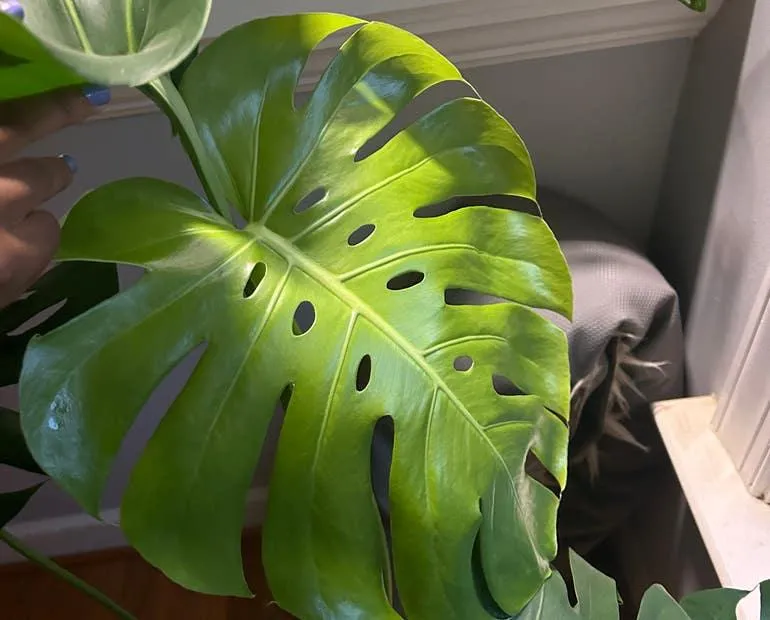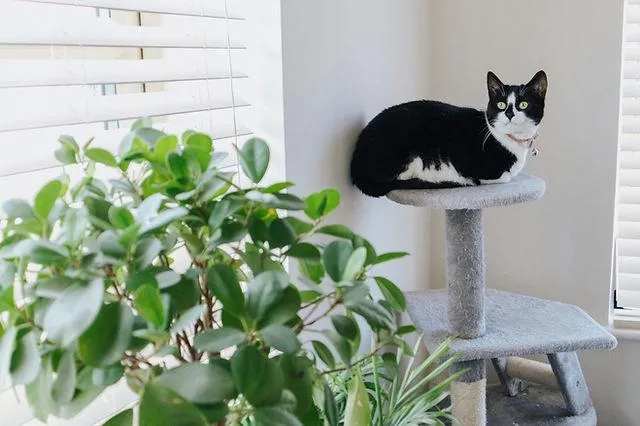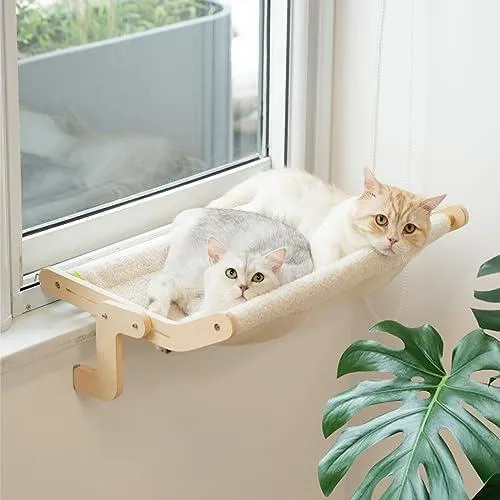Are Monstera Plants Safe for Cats?
If you’re a cat owner considering adding a monstera plant to your home, you’ve probably wondered – are monsteras toxic to cats? In this article, I’ll provide a detailed overview of monstera safety for feline friends and address all the common concerns cat parents have.
Monstera Toxicity Level
To start, let’s talk toxicity levels. The monstera deliciosa, commonly known as the Swiss cheese plant or windowleaf plant, is classified as only mildly toxic to cats according to the ASPCA Poison Control Center. Most outdoor and indoor plants fall into the mildly toxic category, meaning they would have to be ingested in large quantities to cause issues.
The main toxins in monstera are calcium oxalate crystals. If eaten, these crystals can potentially cause mild to moderate oral irritation or stomach upset. However, from my experience as a veterinary nurse, most cats will avoid eating more than a bite or two of monstera due to the unpleasant texture and mild bitterness.
Monstera Safety Depends on Your Cat
When considering monstera safety, it’s important to evaluate your individual cat’s behaviors and tendencies. Some factors that affect a cat’s risk include:
- Curiosity and inclination to taste non-food items
- Access to other houseplants or history of plant chewing
- Age (kittens are more exploratory than adults)
- Supervision and interference when interacting with plants
Cats with a history of chewing or nibbling many different plants and non-food items will likely be at higher risk from a monstera compared to indoor-only cats that ignore all plants. Kittens, due to their natural curiosity, also tend to sample more of their environment orally compared to adult cats.

Assessing Your Cat’s Risks
To assess your individual cat’s risks from a monstera plant, reflect on your experiences together. For example, do you have any houseplants that show signs of minor chewing already? What about non-food items like rubber bands or string? From my own cats over the years, one was very food-focused while others showed interest in toys, plants, and more.
It’s also worth observing how your cat interacts with the monstera when you first bring it home. Do they intently sniff all around or ignore it entirely? Small, controlled experiments can help gauge interest level. Overall catproofing your home and providing plenty of approved chew toys is the best approach with any potentially toxic plant.
Ways to Catproof a Monstera
With the right precautions, many cat owners find monsteras to pose a very low risk. Here are some tips:
- Place the plant high up, ideally out of paw reach on top of a bookshelf or entertainment center
- Use a sturdy support pole so branches and leaves don’t droop within biting range
- Consider potting the monstera in an unwieldy, heavy container that’s difficult for cats to drag or access the soil
- Coat exposed soils with spiky materials like stones or dried chili slices as a deterrent
- Monitor interactions at first and redirect chin rubs or nibbles with an alternative toy or treat
With a bit of catproofing know-how, monsteras can absolutely coexist peacefully with feline friends. It just takes some awareness of each cat’s tendencies and preferences.
Signs of Monstera Toxicity in Cats
On the off chance your curious cat does nibble more than a leaf or two, here are some signs to watch out for that indicate potential toxicity:

- Mild vomiting or diarrhea within a few hours
- Excess salivation or lip smacking due to oral irritation
- Loss of appetite
- lethargy
In most cases, mild monstera ingestion will cause little more than stomach upset. But it’s always best to contact your vet if you notice any concerning symptoms, just to be on the safe side. They can monitor for complications and recommend treatment if needed.
The Bottom Line on Monsteras and Cats
In summary, while monsteras are technically classified as mildly toxic to cats, the risks are generally quite low when a few precautions are taken. From my experience both professionally and personally, many cat owners have found monsteras to peacefully coexist in cat-friendly homes. With the proper placement, catproofing, and supervision matched to your individual cat’s personality and behaviors, monsteras can absolutely be a safe, low-risk addition.
Does your curious cat still seem interested despite barriers? Then monsteras may not be the right pick. But for most indoor cats that leave plants alone, these tropical beauties pose little threat when handled sensibly. With some know-how on toxicity levels, cat behavior types, and safety measures, you can feel confident about giving your greenery-loving aesthetic a monstera makeover!
I hope this overview addressed all the common concerns cat parents have about monstera safety. Please feel free to reach out if you have any other questions! With the right strategies tailored to each kitty companion, many find ways to peacefully coexist with houseplants like monsteras.
Is Monstera Plant Safe for Cats
| Plant Part | Toxicity Level |
|---|---|
| Leaves | Non-toxic unless eaten in large quantities |
| Stems | Low toxicity |
| Petioles | Low toxicity |
| Unripe Fruit | Mildly toxic |
| Ripe Fruit | Highly toxic – can cause vomiting and diarrhea |
| Sap | Potentially irritating to skin and eyes |
| Ingested Amount | Potential toxicity depends on amount ingested |
FAQ
-
Is a monstera plant poisonous to cats?
While monstera plants are not considered highly toxic, some parts can make cats sick if eaten. The sap and aerial roots contain calcium oxalate crystals which can irritate the mouth and cause vomiting or drooling if a cat chews on them. So it’s best to keep monsteras out of reach of curious cats.

-
What are the symptoms if a cat eats monstera?
If a cat does ingest some monstera, you may see symptoms like drooling, vomiting, or difficulty swallowing within a few hours. The crystals can scratch inside their mouth. However, as long as the cat only eats a small amount the chances of serious problems are pretty low. It’s a good idea to contact your vet if symptoms occur.
-
Can monsteras be toxic to cats if the leaves are ingested?
While the leaves themselves don’t contain as many crystals as the stems and roots, cats may still get an upset tummy from chewing on them. The sap can certainly irritate their tongue. So it’s best to be cautious and not allow kitty any access at all, just to be on the safe side. After all, who wants their fur baby to feel yucky?
-
Is it okay for my cat to be around a monstera plant if they don’t eat it?
Having a monstera in the same room as cats should basically be fine as long as kitty leaves the plant alone. However, cats get into everything sometimes. There’s always a chance they might decide to take a taste despite your efforts. So if you really want to air on the side of caution, it’s probably best to keep monsteras and curious cats separated whenever possible.
-
Would a large or small amount of ingestion make a difference?
The amount eaten does to some degree affect the severity of symptoms in cats. A little nibble is less likely to cause issues than chomping down a big chunk. Smaller pieces are also easier to cough back up. Nevertheless, it’s still best not to chance it at all! For the health of your playful pet pal, monsteras and other toxic plants are best displayed elsewhere.
-
Are there any non-toxic plant alternatives I could have around my cat?
Some cat-safe options include English ivy, bamboo palm, snake plant or peace lilies. Pothos vines are also pretty and tend to be ignored by cats. Spider plants can provide lovely green accents without the worry. You might also look into cat-friendly succulents or air plants if you dig the trendy tropical vibes. Do some research to find plants your furry friend won’t view as an all-you-can-chew buffet.

-
What should I do if my cat eats part of a monstera?
If ingestion is suspected, contact your vet right away. They may want to induce vomiting and can monitor your kitty for signs of toxicity. Syrup of ipecac is not recommended since cats vomit reflexively; it’s best to let a medical pro handle it. Offer your cat lots of water too. Remember though, as long as it wasnt a large chunk, odds are good they will be ok with some stomach soothing. Still, play it safe and consult animal Doc ASAP.
